|

Undertow
(Contracorriente)
Wolfe
Releasing,
2009
Director/Screenplay:
Javier Fuentes-Leon
Starring:
Manolo Cardona,
Cristian Mercado,
Tatiana Astengo,
Jose Chacaltana
Julio Humberto Cavero,
Juan Pablo Olivos,
Liliana Alegria Saavedra
Unrated,
100 minutes
|
Kissed
By The Sea
by
Michael D. Klemm
A
shorter version also appeared on abOUTmag.com,
February, 2011
Posted online January, 2011
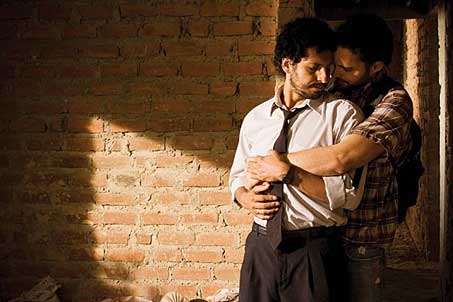
2009's
Undertow (Contracorriente),
the debut film from writer/director Javier Fuentes-Leon, may be the finest
- and most unique - new queer film this reviewer has seen in some time.
Undertow won the Audience
Award at the 2010 Sundance Film Festival and it is also Peru's entry for
this year's best foreign film Oscar.
|
|
 The
setting is a small fishing village on the coast of Peru. Cristian Mercado
stars as Miguel, a young fisherman who, along with most of the other men
in town, casts nets in the waters to make a living. Miguel is poor, but
he is happy and has everything he wants. He has an adoring wife, Mariela
(Tatiana Astengo), and they are awaiting the birth of their first child.
He's active in their church, he blows off steam with his drinking buddies
from the boats, and he enjoys the respect of the community. He also has
a gay lover on the side. The
setting is a small fishing village on the coast of Peru. Cristian Mercado
stars as Miguel, a young fisherman who, along with most of the other men
in town, casts nets in the waters to make a living. Miguel is poor, but
he is happy and has everything he wants. He has an adoring wife, Mariela
(Tatiana Astengo), and they are awaiting the birth of their first child.
He's active in their church, he blows off steam with his drinking buddies
from the boats, and he enjoys the respect of the community. He also has
a gay lover on the side.
|
|
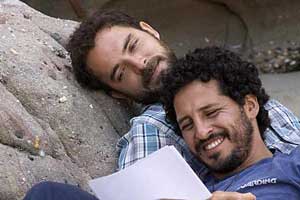 Manolo
Cardona co-stars as Santiago, a young artist who has come to the village
to paint. The villagers know that he is homosexual. While he isn't exactly
shunned, he is not embraced by the community and his presence is more
or less tolerated. The women gossip, the men avoid him, and children throw
eggs at his windows. Tongues would really wag if they knew what
else was going on. As the film opens, Santiago's affair with Miguel has
already been going on for an unspecified time. The two men pretend to
be strangers around town but, when they can steal a moment alone, they
are hot for each other. They have explosive sex in exotic locations, most
notably a very Ansel Adams arch of rock on the seaside. Santiago lovingly
photographs Miguel from a distance, and paints him in secret. Miguel leaves
covert messages to plan their forbidden trysts. Manolo
Cardona co-stars as Santiago, a young artist who has come to the village
to paint. The villagers know that he is homosexual. While he isn't exactly
shunned, he is not embraced by the community and his presence is more
or less tolerated. The women gossip, the men avoid him, and children throw
eggs at his windows. Tongues would really wag if they knew what
else was going on. As the film opens, Santiago's affair with Miguel has
already been going on for an unspecified time. The two men pretend to
be strangers around town but, when they can steal a moment alone, they
are hot for each other. They have explosive sex in exotic locations, most
notably a very Ansel Adams arch of rock on the seaside. Santiago lovingly
photographs Miguel from a distance, and paints him in secret. Miguel leaves
covert messages to plan their forbidden trysts.
|
|
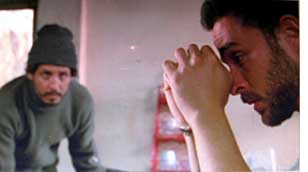 Santiago
wants more from the relationship than Miguel is able, or willing, to give
and the two men quarrel. Miguel needs the security that a wife and children
provides yet is torn between his two lovers. Santiago sees this and thinks
it's best that he leave. Miguel, perplexed, asks "You'll come back, right?"
One day, Santiago really does "come back." Miguel comes home to
find Santiago sitting in his kitchen. Mariela enters but she doesn't see
him. As this surreal scene unfolds, we realize that Miguel is talking
to a ghost. Santiago has accidentally drowned in the ocean, dragged in
by the strong undertow. Because of his strong emotional ties to the freaked
out Miguel, his spirit is trapped in the village. Santiago is confused
and scared, and he needs the man he loves to set him free so that his
spirit can rest. Santiago
wants more from the relationship than Miguel is able, or willing, to give
and the two men quarrel. Miguel needs the security that a wife and children
provides yet is torn between his two lovers. Santiago sees this and thinks
it's best that he leave. Miguel, perplexed, asks "You'll come back, right?"
One day, Santiago really does "come back." Miguel comes home to
find Santiago sitting in his kitchen. Mariela enters but she doesn't see
him. As this surreal scene unfolds, we realize that Miguel is talking
to a ghost. Santiago has accidentally drowned in the ocean, dragged in
by the strong undertow. Because of his strong emotional ties to the freaked
out Miguel, his spirit is trapped in the village. Santiago is confused
and scared, and he needs the man he loves to set him free so that his
spirit can rest.
|
|
 Allow
me to backtrack for a minute. The story opens with a funeral procession.
A relative has died and Miguel has been chosen to "offer" him to God.
The villagers assemble to pay their respects and then follow as the dead
man is carried on a bier to the ocean. Miguel gives the eulogy and takes
the body out on a small boat to bury the deceased at sea. The townsfolk
believe that without this long held ritual, steeped in religious tradition,
the dead will roam the earth unable to rest. Miguel holds Santiago tight
and promises to find his body and "offer" him as he did his cousin. Santiago
never believed in the village folklore but, now that he is dead, he asks
his beloved to bestow the peace that he needs. This, however, will be
the true test of Miguel's love for Santiago. Doing so will reveal their
relationship to the community. Will Miguel condemn Santiago to eternal
torment or will he do the right thing and risk everything for the man
he loves? Allow
me to backtrack for a minute. The story opens with a funeral procession.
A relative has died and Miguel has been chosen to "offer" him to God.
The villagers assemble to pay their respects and then follow as the dead
man is carried on a bier to the ocean. Miguel gives the eulogy and takes
the body out on a small boat to bury the deceased at sea. The townsfolk
believe that without this long held ritual, steeped in religious tradition,
the dead will roam the earth unable to rest. Miguel holds Santiago tight
and promises to find his body and "offer" him as he did his cousin. Santiago
never believed in the village folklore but, now that he is dead, he asks
his beloved to bestow the peace that he needs. This, however, will be
the true test of Miguel's love for Santiago. Doing so will reveal their
relationship to the community. Will Miguel condemn Santiago to eternal
torment or will he do the right thing and risk everything for the man
he loves?
|
|
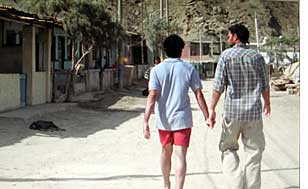 Ironically,
in death, Santiago is finally able to be open with his paramour. Because
no one besides Miguel can see him, the clandestine lovers are at last
able to walk hand in hand openly through the village streets. It is a
striking, and joyous, image. Santiago is a flesh and blood ghost; they
play soccer, they wrestle in the sand, they make love. In one cute scene,
Santiago helps Miguel cheat at cards. Miguel wants these idyllic times
together to last for as long as possible and so he says nothing when he
finds Santiago's body trapped under the water. He is enjoying the best
of both worlds and, later, he asks Santiago if he would consider remaining.
The painter replies, "Now, you finally ask me to stay?" Ironically,
in death, Santiago is finally able to be open with his paramour. Because
no one besides Miguel can see him, the clandestine lovers are at last
able to walk hand in hand openly through the village streets. It is a
striking, and joyous, image. Santiago is a flesh and blood ghost; they
play soccer, they wrestle in the sand, they make love. In one cute scene,
Santiago helps Miguel cheat at cards. Miguel wants these idyllic times
together to last for as long as possible and so he says nothing when he
finds Santiago's body trapped under the water. He is enjoying the best
of both worlds and, later, he asks Santiago if he would consider remaining.
The painter replies, "Now, you finally ask me to stay?"
|
|
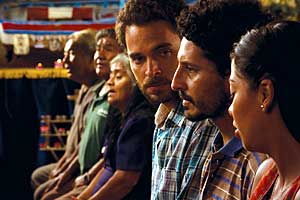 Undertow
is a thoroughly delightful film. It unfolds with the simplicity of a fable.
Richly drawn characters suck us into a nuanced and layered story. The
script construction is superb; Fuentes-Leon is a master storyteller. This
is a film, and not a novel, and his visuals also deliver the goods. The
sun drenched photography is as beautiful as the coastline. I was often
reminded of the beach scenes in Fellini's La Dolce Vita. This could
have been just another tragic tale of forbidden love in a town without
pity but the supernatural element takes us into another realm entirely.
The best ghost stories are the ones that avoid the usual cliches and you
won't see any ethereal over-exposed glows or hear any spooky music here.
This is also a study of small town homophobia that treats the subject
without beating the audience over the head and the ghost story plays a
big role in accomplishing this. Undertow
is a thoroughly delightful film. It unfolds with the simplicity of a fable.
Richly drawn characters suck us into a nuanced and layered story. The
script construction is superb; Fuentes-Leon is a master storyteller. This
is a film, and not a novel, and his visuals also deliver the goods. The
sun drenched photography is as beautiful as the coastline. I was often
reminded of the beach scenes in Fellini's La Dolce Vita. This could
have been just another tragic tale of forbidden love in a town without
pity but the supernatural element takes us into another realm entirely.
The best ghost stories are the ones that avoid the usual cliches and you
won't see any ethereal over-exposed glows or hear any spooky music here.
This is also a study of small town homophobia that treats the subject
without beating the audience over the head and the ghost story plays a
big role in accomplishing this.
|
|
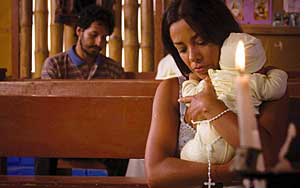 To
call these villagers "old school" would be an understatement. Religion
and tradition is everything. When "the painter" vanishes, no one seems
concerned. Many are glad that he is gone. It would not be good
if news of his affair with Miguel were known. But there wouldn't be any
third act drama if it stays a secret. The town gossip's teenaged daughter
breaks into Santiago's abandoned house to tryst with her boyfriend and
finds a painting. Gossip and rumors spread. When Miguel's son is born,
none of his fishing buddies come by the house to drink his health. To
call these villagers "old school" would be an understatement. Religion
and tradition is everything. When "the painter" vanishes, no one seems
concerned. Many are glad that he is gone. It would not be good
if news of his affair with Miguel were known. But there wouldn't be any
third act drama if it stays a secret. The town gossip's teenaged daughter
breaks into Santiago's abandoned house to tryst with her boyfriend and
finds a painting. Gossip and rumors spread. When Miguel's son is born,
none of his fishing buddies come by the house to drink his health.
|
|
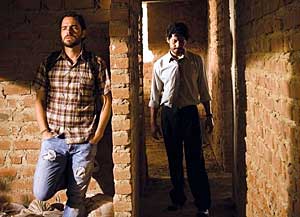 Miguel
is forced to confront what it means to be a man in a culture where masculinity
is everything. Santiago calls him a coward who thinks being a man is having
a wife and kids. "There are hundreds of ways to be a man," he shouts,
"and you are none of them!" Miguel finally realizes that part of being
a man is being totally honest, and he has been selfish to both of the
people he loves. The wife's story, and her part in this triangle, is equally
important. Her feelings in this tragedy are also rightly known and felt.
She and Santiago both play the betrayed diva, and Miguel is very much
the duplicitous tenor. Miguel
is forced to confront what it means to be a man in a culture where masculinity
is everything. Santiago calls him a coward who thinks being a man is having
a wife and kids. "There are hundreds of ways to be a man," he shouts,
"and you are none of them!" Miguel finally realizes that part of being
a man is being totally honest, and he has been selfish to both of the
people he loves. The wife's story, and her part in this triangle, is equally
important. Her feelings in this tragedy are also rightly known and felt.
She and Santiago both play the betrayed diva, and Miguel is very much
the duplicitous tenor.
|
|
 Undertow
is a very sad film but it is a sadness that you relish like a tragic opera,
reveling in the intense emotions. But Fuentes-Leon also knows how to keep
the melodrama in check and he finds a terrific balance. Its middle section
is a pure delight; a love story like no other. Consider this image: Miguel
watches television, his pregnant wife asleep against his side. He invites
Santiago to join them. The ghost sits down next to him and Miguel happily
takes, and holds, his hand because he can do so without fear of discovery.
It's a beautiful moment, one of many that are tender without being maudlin.
A sense of humor peppers these scenes. After a lush romantic interlude
where the tide crashes over the two men doing it on a moonlit beach, Miguel
wakes up naked in the sand and the village priest is standing over him.
When Miguel makes love to his wife, he suddenly sees Santiago sitting
next to the bed. "I'm sorry," the ghost says, "You think of me and I show
up." Undertow
is a very sad film but it is a sadness that you relish like a tragic opera,
reveling in the intense emotions. But Fuentes-Leon also knows how to keep
the melodrama in check and he finds a terrific balance. Its middle section
is a pure delight; a love story like no other. Consider this image: Miguel
watches television, his pregnant wife asleep against his side. He invites
Santiago to join them. The ghost sits down next to him and Miguel happily
takes, and holds, his hand because he can do so without fear of discovery.
It's a beautiful moment, one of many that are tender without being maudlin.
A sense of humor peppers these scenes. After a lush romantic interlude
where the tide crashes over the two men doing it on a moonlit beach, Miguel
wakes up naked in the sand and the village priest is standing over him.
When Miguel makes love to his wife, he suddenly sees Santiago sitting
next to the bed. "I'm sorry," the ghost says, "You think of me and I show
up."
|
|
 All
three leads are exceptional. Manolo Cardona is reportedly "the Brad
Pitt of Peru" and he is certainly a very handsome man. It is very
plausible that Miguel would risk his marriage for a man like him. Cristian
Mercado, as Miguel, generates onscreen heat with both of his lovers. The
passion they all share is the battery that drives this film. Undertow
is an emotional powerhouse and one of the most moving films I have ever
seen. All
three leads are exceptional. Manolo Cardona is reportedly "the Brad
Pitt of Peru" and he is certainly a very handsome man. It is very
plausible that Miguel would risk his marriage for a man like him. Cristian
Mercado, as Miguel, generates onscreen heat with both of his lovers. The
passion they all share is the battery that drives this film. Undertow
is an emotional powerhouse and one of the most moving films I have ever
seen.
|
|
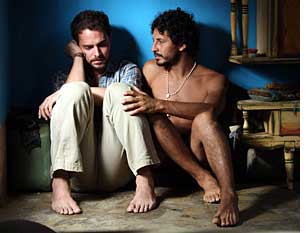 A
reader once wrote to The Advocate that he hated Brokeback
Mountain because it was just another gay story with an
unhappy ending. It's unfortunate that most of the best queer films are
still tragedies (Maurice,
Kiss of the
Spider Woman) but it's also true that forbidden love stories resonate
on primal levels more than romantic comedies. This isn't just a gay thing.
Historically this goes back as far as Gilgamesh. Shakespeare gave
us Romeo and Juliet, which is actually a retread of the myth of
Pyramus and Thisbe. It's retold again as The Fantasticks.
A more modern example of doomed love from opposite sides of the track
is Titanic. And, of course, there is our own Brokeback
Mountain. These stories stir our souls. They are larger than life.
It is impossible not to be sucked into Undertow. A
reader once wrote to The Advocate that he hated Brokeback
Mountain because it was just another gay story with an
unhappy ending. It's unfortunate that most of the best queer films are
still tragedies (Maurice,
Kiss of the
Spider Woman) but it's also true that forbidden love stories resonate
on primal levels more than romantic comedies. This isn't just a gay thing.
Historically this goes back as far as Gilgamesh. Shakespeare gave
us Romeo and Juliet, which is actually a retread of the myth of
Pyramus and Thisbe. It's retold again as The Fantasticks.
A more modern example of doomed love from opposite sides of the track
is Titanic. And, of course, there is our own Brokeback
Mountain. These stories stir our souls. They are larger than life.
It is impossible not to be sucked into Undertow.
|

